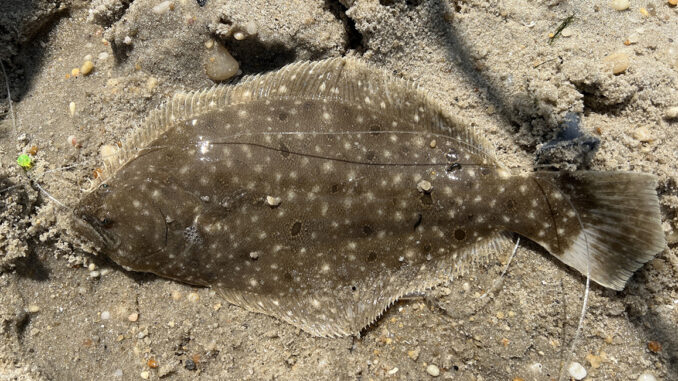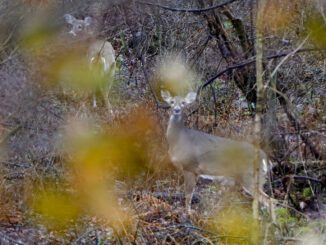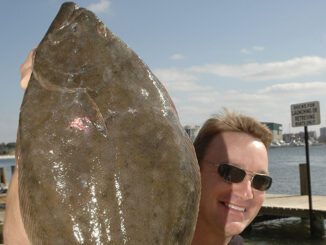
RALEIGH — Recreational anglers will be able to catch and keep flounder this year after all with the North Carolina Wildlife Resources Commission recent approval of a temporary amendment to the flounder rule to allow for a recreational season.
The North Carolina Wildlife Resources Commission (NCWRC) approved the amendment at its July 25 business meeting, and it was subsequently approved by the N.C. Rules Review Commission on July 31. “Under this modification,” a press release from NCWRC explained, “the 2024 flounder season will be open in inland fishing waters and in joint fishing waters for hook and line fishing only on Sept. 1 and 2, and again on Sept. 7 and 8. The daily creel limit is one fish with a minimum size limit of 15 inches.”
The N.C. Division of Marine Fisheries (NCDMFhad stated earlier this year that the recreational flounder harvest season would not open in 2024 due to the recreational sector exceeding the 2023 harvest allotment last year. According to the NCWRC press release, dated Aug. 7, “after reviewing and considering the available data and public comments, the NCWRC adopted amendments to provide a limited 2024 flounder season that balances the needs of the resource and the public.”
The designations for inland and joint fishing waters can be found online at ncpaws.org/ncwrcmaps/FishingAreas. In the Coastal Region, inland waters are shown with no color, joint waters are outlined in red and coastal waters are outlined in blue.
Though this information was shared in the NCWRC’s press release, Brian Cope, editor of CarolinaSportsman.com, said many recreational anglers are confused about where they can fish for flounder during this year’s four-day season.
“I see a lot of misinformation from well-intended recreational anglers going around on Facebook groups about what constitutes each area,” he said.
“The flounder recreational fishery has been demonstrated to be socially and economically important,” said Anna Gurney, public relations manager for NCWRC.
Gurney also shared a letter from NCWRC Chairman Monty Crump, which reads in part: “The recreational sector exceeded its quota in 2023, while the commercial sector did not significantly exceed its quota. This is because the commercial sector’s landings were monitored daily and the season was closed as harvest approached the total allowable landings. Had monitoring for the recreational sector been conducted similarly, the season could have been closed in time to prevent the quota from being exceeded so much that there could be a season in 2024. Additionally, if the recreational sector was allocated an equal share of the total allowable landings, as initially proposed in Amendment 3, the sector may not have exceeded its quota. … Our recreational constituents should not suffer without a harvest season for something that was not their fault.”
The harvest allotment for flounder, as set by the NCDMF, is 70% to the commercial sector and 30% to the recreational sector. Because the split is scheduled to transition to 50% for each sector by 2026, Crump requested to accelerate the transition to a 50% split for 2024 to allow for a recreational flounder season along the coast.
“The NCWRC has authority to regulate fishing in inland fishing waters and for hook-and-line in Joint Fishing Waters,” Gurney said. “In inland fishing waters, flounder is designated an inland game fish and can only be taken by hook-and-line.”
Wildlife Commission fisheries biologists will be conducting a flounder harvest creel survey during the open season dates at many boating access areas, said NCWRC Assistant Chief of Inland Fisheries Corey Oakley.
“We look forward to speaking with anglers to better understand fishing effort and flounder harvest during the shortened season,” he said.
Cope added that he’s glad there will be a flounder fishing season but can’t help feeling disappointed with the limitations.
“I think any opportunities for recreational anglers are always good,” he said. “It’s a shame that it’s all we’re getting this year, but it’s better than nothing.”



